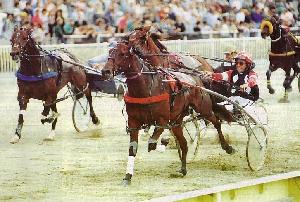| RACING HISTORY |
YEAR: 1991
FEATURE RACE COMMENT
 |
| Master Musician and Robert Dunn win the Derby |
Master Musician had to be the outstanding horse he is to resist the earnest efforts of Impressionist, Sogo and Tartan Clansman in the John Brandon 30 NZ Derby. And Stabilizer might have joined them, too, had David Butcher chosen to leave Mac Magpie's back in the early stages of the race rather than later, when the others were splitting up the prizes.
Impressionist was forced to work a little hard until he got to the lead at the 2000 metres. At that stage, Master Musician, who was able to follow Cadillac Jack forward, was fourth, trailing sweetly on the outer, and Tartan Clansman was behind him. Stabilizer, who was second at the 2300m, was four deep and 7th at the 2000m. Just as he did on the middle night, Robert Dunn put Master Musician into open country near the 750m. He joined the attack before the corner and fought his way clear. His pursuers weren't easy to shake off. Tartan Clansman tried hard to stick with him, Impressionist didn't submit without a fight, and Sogo emerged to battle past the pair right at the end and ran Master Musician to a short length.
It took Master Musician 3:13.5 to complete the mobile 2600m, and only Winning Blue Chip, who won the Derby last year in 3:12.2, has gone faster among those of his age. A son of New York Motoring, bought for $37,000 at the International Sale, Master Musician is raced by Ken McDonald and Eugene Storck, who are scrap metal dealers, and Dunn. Outside of his $500,000 won on bonuses, Master Musician has now earned $772,414, the result of 14 wins and a third from 16 starts.
As he did on the second night, Mr McDonald paid tribute to veterinarian Dr Peter Gillespie who has monitored the health of his young champion so carefully these past few weeks. Said Dunn: "He has a tie-up problem and he seems to pick up a virus so easily. The checks Peter has been able to give him have been vital."
Dunn, aged 36, said the win had been a great thrill, and rivalled that of National Glory in the Sires' Stakes Final. "We've really had so many over the last two or three years, it's hard to choose," he said.
Credit: Mike Grainger writing in HR Weekly